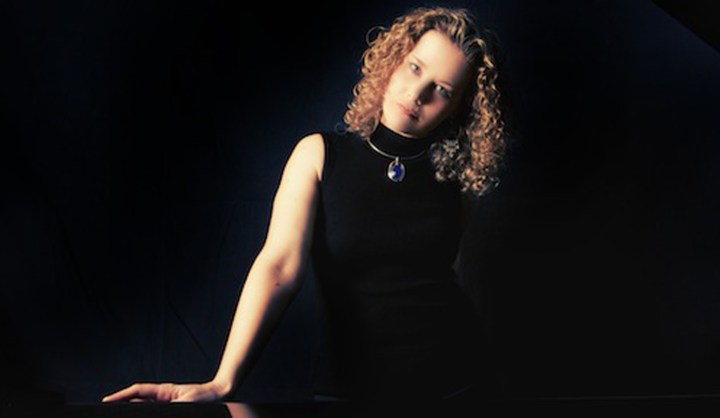Maverick Life
Samba-dy to love: Jazz gem Amanda Tiffin

If slow and steady wins the race, Amanda Tiffin’s got it taped. The jazz singer and pianist has slowly and steadily been building a loyal fan base over the last few years, and there’s a reason for it: she’s good, really good. By MARELISE VAN DER MERWE.
When one’s first encounter with a musician is that they perform Michael Jackson’s Thriller album in its entirety on the piano in six minutes, you’re bound to remember them. Amanda Tiffin might not be one of Cape Town’s flashiest names in jazz, but she’s definitely one of its most memorable. She’s also one of the few artists that can cover The King of Pop, Tori Amos, Joni Mitchell, Busi Mhlongo, Radiohead or the Beatles with the same confidence that she hammers out samba rhythms, her own compositions or jazz standards.
As with many jazz artists, you kind of have to hear her live to appreciate her. Tiffin was one of the musicians that most recently lit up The Crypt during the Cape Town Fringe Festival, and she’s travelling internationally to beat – if you’ll pardon the expression – the band. Perhaps surprisingly, one of her favourite destinations is Japan: “It’s one of the last places in the world that has CDs,” she says, “The people are passionate. Jazz there is a niche market, like anywhere, but the people are passionate. They are collectors.”

Tiffin is one of the newer artists to come onto the Cape Town jazz scene; one of the post-Apartheid crowd, she crept up slowly, completing her formal musical education and making a name for herself among a modest but expanding crew of dedicated fans, including one elderly lady named Dorothy who came to every single one of Tiffin’s early shows – and still comes to this day. Although the Apartheid years bred, ironically, a melting pot of exquisitely talented and unforgettable struggle artists, for Tiffin, the dawn of democracy meant a new freedom musically. “There is more collaboration and celebration now,” she says, “more fusion.” Now, she believes, jazz in South Africa as a whole is “evolving enormously, especially over the last ten years – opportunities have really opened up and there’s an international platform. Before, getting there was difficult and rare.”
The ease of moving across borders has meant a great deal less struggle for the country’s musicians, she believes, and has meant that bonds of support can be formed more easily between musicians all over the country and the international stage. “The calibre is so good. Young jazz artists take it seriously and are very entrepreneurial. They support each other.”
Watch: Amanda Tiffin performing “Happy Samba”
It’s obvious, talking to Tiffin, that teaching and mentorship are special passions, but it’s also here that her optimism starts to flag slightly. Tiffin has been teaching jazz singing at UCT for a number of years – she is Head of Jazz Singing – and one of her bugbears is that she is only able to take on so many students. It’s not a university limitation, she points out; it’s that she humanly only has so many teaching hours to give. In listing students she was unable to take on, some of South Africa’s best-known new names come up; nonetheless, she believes, formal tertiary education is not the right path for everyone, although its standard is extremely high.
“At UCT, at WITS, at Stellenbosch, the standard is fantastic,” she says. “But in schools it has dropped massively. There’s a dumbing down of music education. There are very good teachers, there are very talented people. But they are in under-resourced schools where music is the last focus. That’s a pity, because people who learn music do better in maths. It would be advantageous all round to drive better performance in music.”
The UCT music school does what it can, she says, but it’s not enough to combat the problem at secondary level. “A lot of our graduate students are teaching music in schools and Ian Smith is directing the Delft Big Band.
Watch: Amanda Tiffin singing “It Don’t Mean a Thing”
“However, the Ministry of Education is not interested. And we have tried. We are just trying to do what we can, and I do think we are doing amazingly well.” It remains a challenge, however, to bring students up to tertiary standard, she says, regardless of the talent they display at auditions. And a talent shortage there most certainly is not.
In the meantime, Tiffin is focusing on building her partnership with veteran Dave Ledbetter as Facing South. Asked what they bring to the table musically, she answers simply: “Lunacy.” “We both love the same music,” she explains. “He’s an encyclopaedia, that guy; a mad genius. He can remember any song, any lyric, but don’t ask him what he did this morning. He has a wicked sense of humour.
“I’m more organised, but I don’t have a lot of time to compose, and that frustrates him. People seem to love the balance of our sound together; his guitar and my voice.”
Watch: Dave Ledbetter and Amanda Tiffin singing “Desert Road”
Fans will be glad to know there’s a Tiffin-Ledbetter album coming out next year featuring acoustic guitar and voice – “folk and world music with jazz influence”, says Tiffin, which will be recorded in January/February and out in April/May “if I get off my butt and write some songs”. There’s also a trio album in the pipeline with award-winner Shannon Mowday and two Swedish musicians, courtesy of a local funding injection, after an illness and financial constraints some years ago forced Tiffin to postpone the album.
If you’d like to see Tiffin perform, look out for her with Dave Ledbetter at the Cottage Club in Capri on 18 October or follow her on Facebook. DM
















 Become an Insider
Become an Insider